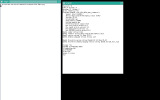- Thread Starter
- #51
I'm testing with ~360p/480p videos, below 720p for sure.Hardware Graphics acceleration for decoding and watching video will not work as your video card doesn't have hardware capabilities to decode VC,1VP9,AV1 codecs. It's all done on your CPU which can't keep up with 720p or 1080p.
I accept the limitations of the integrated graphics. I know it might not support latest codecs. But even with software renderer it should not be that bad. (It didn't even play the video, except when I installed my modded mesa-classic ports. Even then it struggles on fullscreen.) On 12.4 32-bit it used to play videos on fullscreen just fine. So the slowdowns does not seem to be due to hardware limitations.
xdriinfo, xvinfo, glxinfo outputs indicate that graphics drivers are not being used on 14 32-bit and is using software renderer. Drivers are working as expected on 14 64-bit with video playing without issues on fullscreen.
As far as I know vdpau is for nvidia/amd cards. I don't have any separate graphics card except Intel integrated graphics. But still here is the output (on 14 64-bit):If you want to see it by yourself install multimedia/vdpauinfopkg install vdpauinfoand run it. in terminal then post back here the output of "Decoder capabilities:" section for all video codecs.
Code:
$ vdpauinfo
display: :0 screen: 0
Failed to open VDPAU backend Shared object "libvdpau_va_gl.so" not found, required by "vdpauinfo"
Error creating VDPAU device: 1I'm attaching the outputs from 14 64-bit in case it is useful in future.The only think that you can use on it is OpenGL for GL_Renderer you can check the capabilities via glinfo or glxinfo and drm_info
Let me know if I can check anything else on 64-bit. I'll soon be replacing it with 32-bit again to continue troubleshooting.

